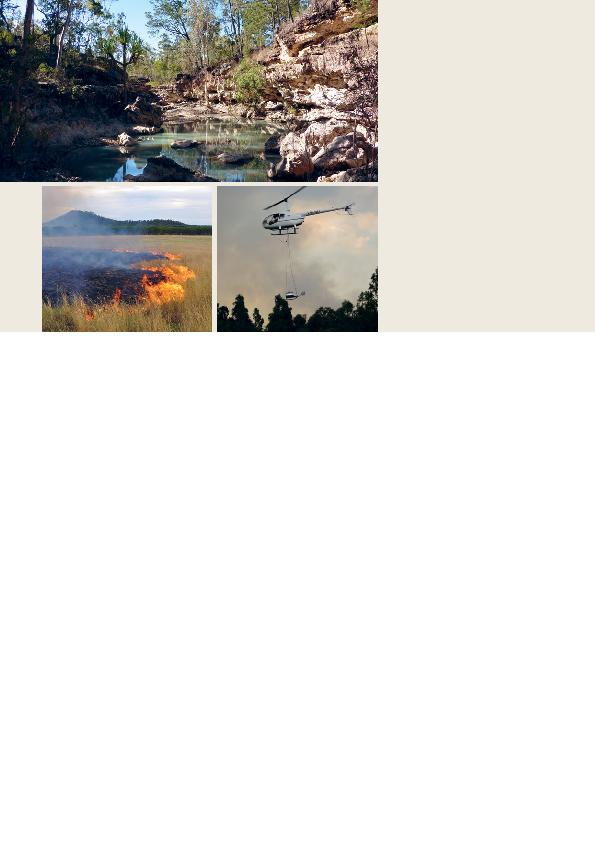
Carnarvon Station Reserve, Qld
the ecology of Carnarvon Station Reserve.
Chris Wilson, Carnarvon's Reserve Manager,
uses fire to prevent fire.
moisture, cool temperatures and light winds,
Chris and his team light small fires and let
them run their course. This creates a mosaic
of burnt and unburnt patches. Early analysis
indicates that this fire management regime has
reduced the extent of wildfires on the property
and helped protect fire-sensitive vegetation.
However, we have more yet to understand.
the mosaic burning is having on the
populations of forest birds, on the recovery
of wildlife populations and on fire-sensitive
vegetation. This year, Chris and ecologist
Murray Haseler have been using satellite
imagery, maps, short- and long-term rainfall
data and measures of vegetation growth,
coupled with scientific surveys, to evaluate
the effects of these fires and inform future
land management practices.
question fully. A PhD study being undertaken
by Emma Burgess from the University
of Queensland is indicating that our fire
management is an effective approach for
retaining the diversity of bird species.
on Yourka Reserve, Qld
in our fight against Siam weed on Yourka
Reserve, Qld. As years of manual removal and
had hoped for, the Yourka Fire Management
Plan was adapted to accommodate a
new approach to landscape-scale weed
management. We used a helicopter trailing
a gel-burner to set targeted fires over more
than 16 500 hectares of land to burn the weed.
Using fire to control a widespread weed is an
ambitious project, made possible by improved
Bush Heritage safety systems, increased
resourcing, and a willingness to review and
adapt our land management strategies to
achieve our conservation goals. The results
so far have been impressive.
surveys to locate and treat Siam weed in
the least accessible areas of the reserve.
Surveying on horseback is an efficient
means of covering long distances in
difficult terrain and the higher vantage
point makes it effective for detecting the
weed in dense undergrowth. While using
this `low tech' method to find Siam weed we
are also adopting advanced technology for
mapping and data management. Marrying
old and new technology demonstrates an
organisation-wide commitment to finding
the best tools for the job.
project is supported by the Australian Government's
Clean Energy Future Biodiversity Fund
Photograph by Jen Grindrod
Carnarvon Station Reserve, Qld.
Photograph by Cathy Zwick
to control Siam weed, Yourka Reserve, Qld.
Photograph by Leanne and Paul Hales
an organisation-wide